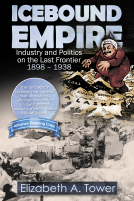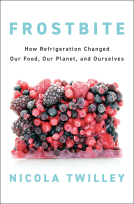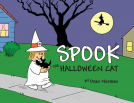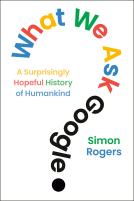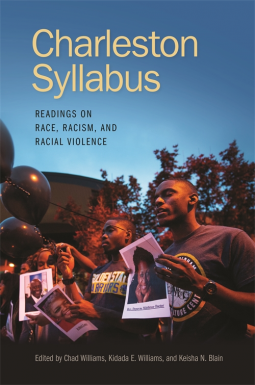
Charleston Syllabus
Readings on Race, Racism, and Racial Violence
by
This title was previously available on NetGalley and is now archived.
Send NetGalley books directly to your Kindle or Kindle app
1
To read on a Kindle or Kindle app, please add kindle@netgalley.com as an approved email address to receive files in your Amazon account. Click here for step-by-step instructions.
2
Also find your Kindle email address within your Amazon account, and enter it here.
Pub Date May 15 2016 | Archive Date Jun 03 2016
Description
On June 17, 2015, a white supremacist entered Emanuel AME Church in Charleston, South Carolina, and sat with some of its parishioners during a Wednesday night Bible study session. An hour later, he began expressing his hatred for African Americans, and soon after, he shot nine church members dead, the church’s pastor and a South Carolina state senator, Rev. Clementa C. Pinckney, among them. The ensuing manhunt for the shooter and investigation of his motives revealed his beliefs in white supremacy and reopened debates about racial conflict, southern identity, systemic racism, civil rights, and the African American church as an institution.
In the aftermath of the massacre, Professors Chad Williams, Kidada E. Williams, and Keisha N. Blain sought a way to put the murder—and the subsequent debates in the media—in the context of America’s tumultuous history of race relations and racial violence on a global scale. They created the Charleston Syllabus on June 19, starting it as a hashtag on Twitter linking to scholarly works on the myriad of issues related to the murder. The syllabus’s popularity exploded and is already being used as a key resource in discussions of the event.
Charleston Syllabus is a reader—a collection of new essays and columns published in the wake of the massacre, along with selected excerpts from key existing scholarly books and general-interest articles. The collection draws from a variety of disciplines—history, sociology, urban studies, law, critical race theory—and includes discussion questions and a selected and annotated bibliography for further reading, drawing from such texts as the confederate constitution, South Carolina's secession declaration, songs, poetry, slave narratives, and literacy texts. As timely as it is necessary, the book will be a valuable resource for understanding the roots of American systemic racism, white privilege, the uses and abuses of the Confederate flag and its ideals, the black church as a foundation for civil rights activity and state violence against such activity, and critical whiteness studies.
This book is dedicated to
Cynthia Hurd
Susie Jackson
Ethel Lance
DePayne Middleton-Doctor
Clementa Pinckney
Tywanza Sanders
Daniel Simmons Sr.
Sharonda Singleton
Myra Thompson
A Note From the Publisher
Kidada E. Williams is associate professor of history at Wayne State University and the author of They Left Great Marks on Me: African American Testimonies of Racial Violence from Emancipation to World War I.
Keisha N. Blain is assistant professor of history at the University of Iowa. Her work has been published in the Journal of Social History; Souls: A Critical Journal of Black Politics, Culture, and Society; and Palimpsest: A Journal on Women, Gender, and the Black International.
Advance Praise
“Do inflamed emergencies tend to produce innovative scholarly responses? Even a glancing perusal of this enlightening and brilliant response to the Charleston massacre of 2015 leads inexorably to an emphatic answer: yes! These diligent scholars provide eyeopening historical and contemporary chapters that shed light on why this tragedy occurred—and what must be done to ensure that it will not recur.”—Gerald Horne, author of The Counter-Revolution of 1776: Slave Resistance and the Origins of the United States of America
Available Editions
| EDITION | Other Format |
| ISBN | 9780820349572 |
| PRICE | $29.95 (USD) |
Links
Average rating from 5 members
Featured Reviews
As an American in Japan there's literally half a world between me and events in my home country. Major news gets clipped down by the Japanese media - "Yet another shooting in America. Somebody shot X people because of historical hatred/current events/being psychologically unstable. Y people are protesting. Police are investigating."
After the Charleston shooting, where a white male shot nine black people in a racially motivated crime, I knew I needed more information. The Japanese news didn't have it. The American online media added some background, but not enough. Luckily #CharlestonSyllabus, a hashtag on Twitter started by the editors of this book, collected all kinds of books, articles, primary source documents, and even songs that related to the shooting and the history that leads up to it. The list is extensive and deep; you can find it here and at the back of the book.
Extensive and deep is good, but it also meant I had no idea where I should start. I put a couple of titles on my library wish list, where they still linger.
That's where this one volume Charleston Syllabus comes in. It's organized into six chapters covering everything from slavery and religion to Malcolm X and Black Lives Matter. Each section starts off with a historical overview before turning over to historical documents, scholarly analysis, and articles from the days and weeks after the massacre. I love how all the different kinds of writing nestle up against each other - a slave's first person account next to a song they may have sung while working, next to a scholarly article on the events of the period. The variety and breadth of the sources help you get a deep understanding of the historical context and how it relates to today's news.
Throughout the book I found myself thinking, how could my education have failed me so badly? Why haven't I studied Ida B. Wells-Barnett, a kick butt investigative journalist? Why wasn't an annotated Constitution of the Confederate States put before me? There is so much more history than the cotton gin and Martin Luther King, Jr.
Charleston Syllabus filled in many of those holes in my knowledge. It opened my eyes to topics and controversies I only heard of in passing. It gave me a lot to think about and pointed me towards time periods and people I'd like to study more deeply.
If you're American this book will help you grapple with the complicated mess that is racial relations in our country. If you're not American it will show you how current events are related to a long and terrifying history of slavery and oppression. Charleston Syllabus is a must read for anyone that wants to understand how things went wrong and think about where we can go from here.
 Kel M, Media/Journalist
Kel M, Media/Journalist
Reading race in America
Charleston Syllabus: Readings on Race, Racism, and Racial Violence, edited by Chad Williams, Kidada E. Williams, and Keisha N. Blaine (University of Georgia Press, $29.95).
The Fire This Time: A New Generation Speaks About Race, edited by Jesmyn Ward (Simon & Schuster, $25).
Hanging Bridge: Racial Violence and America’s Civil Rights Century by Jason Morgan Ward (Oxford University Press, $29.95).
Invisible Man, Got the Whole World Watching: A Young Black Man’s Education by Mychal Denzel Smith (Nation Books, $24).
We Gon’ Be Alright: Notes on Race and Resegregation by Jeff Chang (Picador, $16).
That I’m reviewing these in alphabetical order is particularly felicitous for this selection of recent books on race and racism in the United States; most people have neither the time nor the money to read everything, so let’s start with the basics.
Charleston Syllabus: Readings on Race, Racism and Racial Violence emerged in the aftermath of the murder of the Charleston 9, a black bible study group who were gunned down in one of the oldest African American churches in the country. It began as a Twitter hashtag, aimed to remedy the ignorance of many (mostly white) Americans about the history of racial violence, especially when directed at the black church.
It evolved into this collection, a selection of excerpts from longer scholarly works and literature that also contains some essays written specifically for this book. Among them, a history of the first attack on the Emmanuel A.M.E. Church of Charleston and a history of the church itself.
With a poem by Claude McKay, the lyrics to Nina Simone’s “Mississippi Goddamn,” and Claudia Rankine’s “The Condition of Black Life Is One of Mourning,” Charleston Syllabus is quite accessible. But it also dives into scholarship on the lives of African Americans from slavery through the Civil War, Jim Crow, segregation, civil rights, and ongoing struggles with institutional racism and police violence.
It’s not the final word on race relations, but it is the perfect place to start.
Like Charleston Syllabus, The Fire This Time includes Rankine’s piece, a magnificent and heartbreaking explication of the burden of grief that American violence has laid upon its black citizens.
As noted in the title, James Baldwin’s spiritual grandchildren take voice in this collection of essays (and a couple of poems), edited by National Book Award winning novelist Jesmyn Ward. It includes Ward’s own experience of meeting her state’s senator, Trent Lott, and having a bullwhip cracked overhead as he demonstrated how it’s done. Edwidge Danticat asks Abner Louima, sodomized with a broom handle by NYPD officers in 1997, what he thinks every time he hears the name of another black person killed by cops; Kevin Young examines the cultural appropriation of Rachel Dolezal; and what at first seems like a digression into the music of Outkast brings it all back home.
Baldwin would no doubt be proud at the work of his literary descendants, but he’d also be frustrated; it was supposed to be better by now.
Jason Morgan Ward’s Hanging Bridge: Racial Violence and America’s Civil Rights Century is a more scholarly book, focusing on sites of racial violence in Mississippi. The titular bridge is the Shubata Bridge in Clark County, Miss., site of so many lynchings of black men by white mobs that it became the “hanging bridge.”
Ward details the crimes against humanity, but just as important, he focuses his attention on the resistance to these murders. Notably, the work of Walter F. White, Sarah Creigen Kennedy, and the NAACP is detailed, as is the effects of the voter registration efforts following the Civil Rights Act.
Ward’s book is a slice of time, crucial to understanding the justified reaction of African American citizens to police violence against them.
A contributing writer at the Nation, Mychal Denzel Smith’s memoir positions him as smack dab in the middle of the generation we’re now calling “millennial.” The son of a military man, he hid his hip hop music and went to an historically black college, but the murder of Trayvon Martin was the match that lit his political awakening.
But he expands his thinking to include the depradations visited upon black women, and the violence against black gay men and transwomen (black transwomen have a death by murder rate that is astonishingly high). This leads him to make the connection: race, gender, sexual orientation are all linked in a daisy chain of bullshit that results in death and destruction.
We can only hope that the rest of his generation finds their way to being as woke as he is; we’ll need them all.
Finally, We Gon’ Be Alright: Notes on Race and Resegregation breaks out of the racial binary. Race and racism in the U.S. don’t exist on a black-white paradigm, though that’s easy to forget; Jeff Chang reminds us that racism and white supremacy work on other people of color as well.
This series of essays looks at a variety of topics–Black Lives Matter, Donald Trump’s presidential candidacy, even the whiteness of Hollywood–and makes the case that we are stuck, as a culture, in a cycle of racial flare-ups and cool-downs that never address underlying issues. It is a manifesto that asks us not to forget, this time, whatever this time is, and to take up the work of getting race “right” in America. In that sense, it is a very hopeful book.
